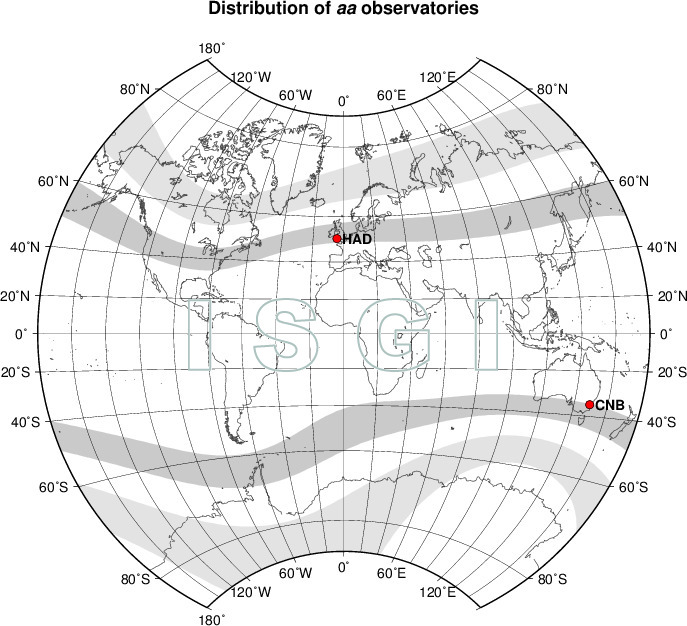Service International des Indices Géomagnétiques
International Service of Geomagnetic Indices
| Index |
|
 |
||||||||||||||||||||||||||||||
| Available | from 1868 onwards | |||||||||||||||||||||||||||||||
| Type of index | K-derived planetary | |||||||||||||||||||||||||||||||
| Purpose | To measure the amplitude of global geomagnetic activity during 3-hour intervals normalized to geomagnetic latitude ±50°. aa was introduced to monitor geomagnetic activity over the longest possible time period. | |||||||||||||||||||||||||||||||
| Network | Made of 2 antipodal magnetic observatories. (see list of actual and previous aa magnetic observatories) |
|||||||||||||||||||||||||||||||
| Citation | Mayaud, P.-N., Menvielle, M., & Chambodut, A. (2023). aa geomagnetic index. EOST. (Dataset). doi:10.25577/9z05-v751 | |||||||||||||||||||||||||||||||
| Derivation | aa is derived from the K indices measured at two antipodal observatories. The K indices
are converted into amplitudes using mid-class amplitudes (K2aK) then averaged with weighting factors that account for
slight changes in geomagnetic disturbance intensities between successive Northern and Southern aa-observatories.
|
|||||||||||||||||||||||||||||||
| ISGI Collaborating Institute |
EOST, Strasbourg, France |
|||||||||||||||||||||||||||||||
| IAGA endorsed | IAGA Bulletin 37, 1975, p. 128, resolution 3, doi:10.25577/g2bk-d694 | |||||||||||||||||||||||||||||||
| Related geomagnetic indices (enclosed in main index downloaded file) |
|
|||||||||||||||||||||||||||||||
| Historical references |
• Mayaud, P. N. (1971) - Une mesure planétaire d'activité magnétique basée sur deux observatoires antipodaux, Ann. Geophys., 27, 67-70. • Mayaud, P. N. (1972) - The aa indices: A 100-year series characterizing the magnetic activity. J. Geophys. Res., 77(34), 6870-6874. doi:10.1029/JA077i034p06870. |
|||||||||||||||||||||||||||||||
| License | ||||||||||||||||||||||||||||||||